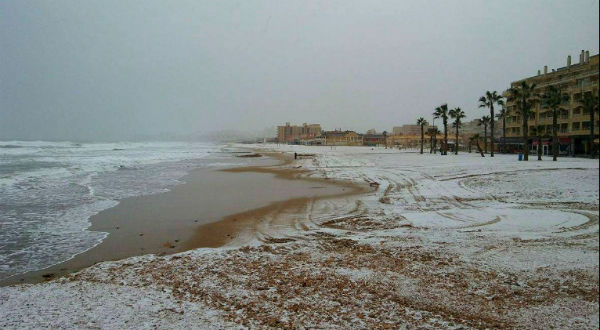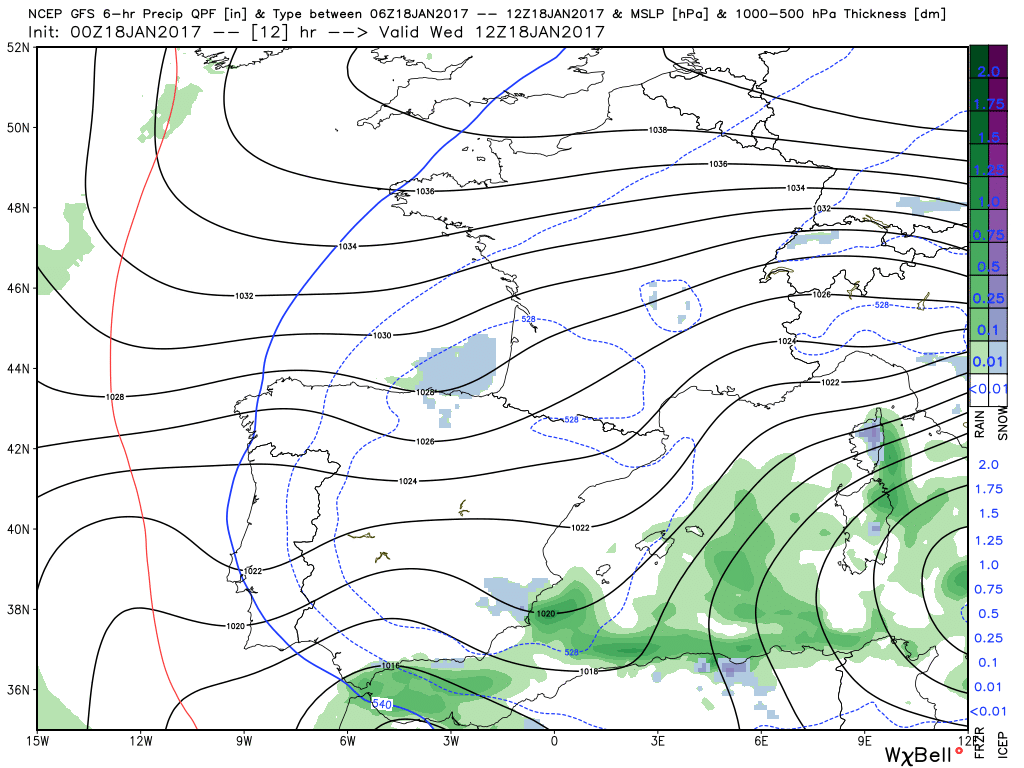
Cold and wet weather since the New Year across southern Europe likely to raise prices or even bring a shortage of certain vegetables and salads that supply the 'out-of-season' market.

You may have saw the pictures in the news a few days ago of rare snow settling on the beaches of southeastern Spain. Now it could be affecting the supply and certainly putting up the prices of certain vegetables and salad crops.
Cold and dry air had already arrived unmodified on its land crossing from the northeast all the way from a very cold NW Russia on Tuesday behind a cold front moving southwest across Iberia. Then on Wednesday, an area of low pressure developing over Morocco / western Algeria expanded north, taking outbreaks of heavy rain north which turned to snow as it hit the cold air already over Spain.
Weather system over north Africa and cold air over Iberia brought some rare snow (blues/purples) to low elevations of SE Spain on Wednesday, before becoming confined to mountains inland.

Snow fell on the beaches of the southeastern coastal regions of Valencia, Alicante, Murcia and even the shores of the Balearic Islands on Wednesday. The Costa Blanca literally lived up to its name as the ‘White Coast’, the Costal del Sol was anything but a stretch of Mediterranean sandy beaches to go to soak up the sun.
The city of Murcia in southeast Spain averages a high of 16.6 C (61.9 F) in January, La Palma in Majorca around 18C. Wednesday saw both cities blanketed in snow.
The same storm that brought Wednesday’s unusual snowfall will continue to impact the eastern half of Spain today and through the weekend, bringing heavy rain that could cause local flash flooding, mountain snow and also strong winds – which will whip up the western Mediterranean to bring some coastal flooding too. Snow has even fallen across parts of Algeria in northern Africa.
Cold weather has also affected southern European countries further east too since the beginning of the year. A wave of bitterly cold air all the way from northern Russia reached as far south as southern and central Italy between the 5th and 7th, bringing rare snow to Bari and Naples. The cold wave also swept south further east across the Balkans, Greece and Turkey, bringing significant snowfall. The first weekend of January saw temperatures barely get above freezing in Athens. While a snowstorm stopped all flights in and out of Istanbul's main Ataturk Airport for a time.
Italy and the Balkans have seen yet more heavy snow and rain arrive yesterday, as an area of low pressure over southern Italy and central Mediterranean drags in cold air from the northeast. Most of central and southern Italy has seen rain, but over higher terrain, heavy snow has fallen, with over 2 metres of snow falling over the northern and central Apennines. The same area which was rocked by earthquakes on Wednesday.
The cold weather and heavy rain affecting Italy over the last fortnight and Spain over the last few days is affecting the growth of salad crops and vegetables which supply the British supermarkets during the winter months. Heavy rain, flooding and low light levels since December in the Murcia region of SE Spain has proved catastrophic for growing 80% of Europe’s fresh produce. There are also big problems in Turkey, Greece, Morocco and southern Italy, which are all countries that normally supply northern Europe in the winter months. Some vegetable crops in these countries have been completely decimated after they had heavy snow and low temperatures recently.
The cold temperatures and poor growing conditions from heavy rain have particularly been hindering courgette growth, hence the papers reporting a ‘courgette crisis’ this week. But also, other vegetables such as aubergines and peppers have been growing slowly along with problems of growing salad crops such as iceberg lettuces. This is ultimately putting up the price on certain vegetables and salads which are out-of-season of being grown in the UK. So supermarkets are increasingly having to turn further afield to countries such as the USA to meet the demand. There could be shortages in our supermarkets though of these veg, as the UK buyers seem less prepared than other European countries to pay higher prices and the supermarkets may rather leave shelves empty.
So, thanks to the weather, maybe this is a good opportunity to east more seasonal vegetables, such as those British grown fruit and vegetables that can be supplied for much of the year due to cold storage – such as potatoes, root vegetables, brassicas, apples, pears, etc.